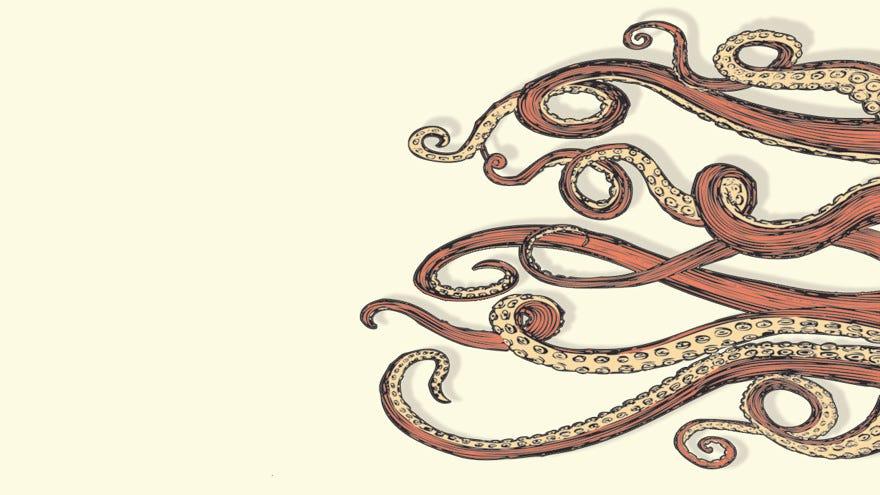WRITE FOR THE FUTURE
Because the Present Is Not Enough
I received a question from our CORO/Office Hours that I will summarize here (though you may read the question in its entirety in the comment section of the post).
My interlocutor is a Russian immigrant in Australia who “wrote a novel manuscript about how much it sucks to be a Russian migrant. Then my birthland invaded Ukraine. I've been told from a bunch of sources, literary-scene and otherwise, to try and publish with my legal name…can be an obstacle, and the topic I write on ("the RussiAn miGrant exPeRienCe", I don't actually write about Russia itself) is unpublishable...A part of me wants to lean harder into my subject, but it seems unrealistic that it'd even see print..there's a war on, why would people want to read about this?, a publisher to take a risk on such a subject in the current climate for fiction seems silly — and there's not enough 'Russian kid migrants' here to make for a commercially viable audience…any advice?"
ONE
First, thank you for your question.
As always: I’m no supreme expert, especially not on anything involving the Russian Invasion of Ukraine, but your question prompted some related reflections. I hope they help, but if they don’t, please forgive.
First, know that unless you’re a Stephen King or already plugged firmly into the mass market machine, there’s always going to be an economic argument against any book, anywhere, whether it’s written by a Russian immigrant in Australia in the middle of a an unpopular Russian war or a Dominican immigrant from NJ with trauma for days, or person X from Y doing Z.
You know the drill: reading is in decline and publishers ain’t buying like they used to. Long story short: anyone waiting for economic conditions to improve before writing (or publishing) a book is gonna be waiting a hell of a long time.
But I get it, I really do. Back when I was starting out as a writer, when I first imagined writing might be a possibility, I suffered these market jitters too. At the time, all sorts of people in my life insisted there was no “market” for a Dominican writing about growing up a Dominican nerd in NJ. If I was writing about growing up a Dominican tough guy in NYC, maybe...
...or maybe not. Dominicans just weren’t on in those days, as writers or as literature; publishers didn’t seem to want us, no war needed1.
I got so worked up about my non-existent market prospects that I went so far as to invent a Kolynos Super White pseudonym: R--- C----. My "cracker passport" as I called it at that time. I even wrote a draft of a horror novel under that name with all white characters, set in, of all places, Australia.
I kid you not.
Looking back now I’ve come to understand that this was a supremely important crossroad in my writer’s journey. For people of color the devil of whiteness tempts in ways that the traditional diablo never could imagine. Things could have gone a whole lot of different ways (a story that deserves its own newsletter) but what matters here is that in the end I abandoned R--- C----. Got him and his temptations behind him, and went with my name that no one can pronounce (the T is silent!), whatever the consequences.
What you decide is ultimately up to you. Plenty of writers deploy pseudonyms for various reasons. Some ethical, some not so ethical. And there are writers who can make this masquerade work for them.
I clearly could not.
TWO
What I’m trying to get at here is that yours strikes me as an old question, though its context is very now. One that bedevils all artists to some degree or another, and which every artist needs to answer for themselves.
How much do we owe the Work and how much do we owe the societal / economic worlds that surround us?
Said differently: how much do we owe the Art; how much do we owe our careerist desires?
There are plenty of artists for whom the practical demands of career trump any and all artistic considerations.
And plenty of artists for whom the Art is the Absolute, and they would sooner put their heads in a fire than to concede voluntarily to market forces.
And between these poles is a spectrum of a trillion variations.
I gave up R-—C--- for lots of reasons but at the heart of that decision, I suspect, is the following:
When a writer centers market considerations, instrumental careerist considerations, a writer is, at some level or another, writing their book for the present. The present becomes a central shaping force, a defining audience, and its concerns and prejudices become obstacles to be gamed: sometimes we change the work to fit the present’s criteria; sometimes we change our names, but no matter what the tactic, appeasing the present becomes part of the job.
For others artists, however (myself included), the present is not something to be courted.
The present is something to be transcended.
We all, of course, at a practical level, write to the present – the present is an unavoidable reality, it’s what we know, our ontological gravity – but that’s not the same as making the present central to your writerly imaginary, letting it shape and delimit your vision.
Even as we render unto the present what belongs to the present, this group of artists I identify with is reaching out to a different audience, far more uncertain, not fully realized and yet, because of this inchoateness, endless with potential.
I speak, of course, of the future.
THREE
Some among us accept the neoliberal’s admonishment that the future will only ever be bleaker than the present (and its evil corollary: be grateful for what you have!) but come on, who knows what the future will hold? Like, for real?
I sure as hell don’t, and since in truth no one knows, I prefer to imagine and write for a future where a writer like me will be valued for our art and our simultaneities; a future where a writer like me will not be simplified or border guarded; a future where our art is less a uniformed foot-soldier for any one ideology than a troubling unsettling insurgency against all ideologies; a future where our magnificent mangled complexities are not persecuted or maligned, but are so normal they’re nearly invisible.
I figure all art is a faith-based initiative – and if you’re writing literature in this age of screens you got some santos level faith – so why not choose to put your faith at the humble muddy feet of a better future than atop the bloody crown of this predatory present?
Writing for the future is good for writers in a myriad of ways.
To start, it spares you having to change your name or change your book to avoid the censorial judgments of the present. If the present hisses Black poor weird José Ivan won’t sell, the future sings Send us all the Black poor weird José Ivans you have!
Writing for the future keeps the approval impulse at bay, always a big plus. Approval compels a writer to write for applause, for likes, which is fine for some, but if you’re like me and your work can only exist in the difficult nuances beyond the simplicities of likes, the approval impulse is something you need to manage, to control. I mean, approval as an outcome of the writing is nice, but for some artists writing for approval is the end of our writing.
Importantly, writing for the future reduces market anxieties and when done right reduces market manipulation. Look, I get it, we live on a capitalist planet and capitalist logics are completely naturalized in this dystopia of ours. In such a world there’s nothing inherently wrong with trying to help your book get ahead – by hooking a respected agent, scoring excellent blurbs (the bigger the names the better), landing a top-drawer publisher and a newsworthy advance. (Whether these things actually work is another question altogether.)
But we all know that this type of present-focused careerism can awaken the great capitalist vampire-squid2 in all of us, and this squid’s blood-funnel ways can easily take over a writer’s life and their work. I’m not superhuman; I have a capitalist vampire-squid inside me like everybody else, and it bursts into tentacular life at the slightest hint of money/advantage, and what these 28 plus writing years have taught me is that I do better work, am a better human, when the vampire squid sleeps. And it sleeps best in me when I’m focused not on gaming the precarious present but reaching out to the still-possible unforeclosed future.
Writing for the future also helps an artist survive the inevitable disappointments that the present unleashes on all of us. We all want the present to acknowledge and reward us in extremis, but for most of us that ain’t going to happen. What keeps an artist working under such terrible conditions? The regenerative promise of the future. The promise that there are readers waiting for us beyond the next horizon. Your book might not have a ton of friends here in the present, but it could be everything that the future needs, and that’s the faith a writer needs, whether the present is working for them or not.
But ultimately, writing for the future keeps the artist focused squarely where it should be: on the work itself and its weirdness, and not on the vampire squid within or on the ancillary bullshit (market, political, social or otherwise) that surrounds our every attempt to authentically express our deepest selves.
PS I know I’ve been writing a lot on this audience theme; next time (hopefully) some notes on Time as a narrative structure.
How much or how little that has changed is up for debate.
Famous opening lines to Matt Taibbi’s Rolling Stone piece: “The first thing you need to know about Goldman Sachs is that it’s everywhere. The world’s most powerful investment bank is a great vampire squid wrapped around the face of humanity, relentlessly jamming its blood funnel into anything that smells like money.”





Y'all best mind your Uncle Junot. He knows what he's talkinbout. And take money and fame out of the equation of your writing or you will risk imperiling it with a curse. And remember, the venomous squid doesn't even know how to write.
What helps you put the capitalist vampire-squid to sleep? For me, lack of recognition and success wakes it up. Many people here on Substack (and elsewhere) selling their services start their sessions by praising my work and then go into the marketing, networking, and formatting side of things–I assume they do this with most people. They say nothing negative about your craft (this makes the writer who's consuming their services feel good enough to come back) and launch into the "secrets in how they've helped hundreds of writers achieve their goals" that involve formatting, networking, funnelling strategies, or whatever the fuck else. This not only wakes up the capitalist vampire-squid but turns you into it.
I always tell myself that once (if?) I ever achieve success (a liveable income from writing), I will no longer need to give into the vampire-squid. Aside from book signings, lectures, and interviews, I can focus on my craft. This is a dream and possibly not a realistic one. So, what is the reality of an esteemed author's relationship with the capitalist vampire-squid? Do the tentacles reach further, or do you have the sword to cut them off?